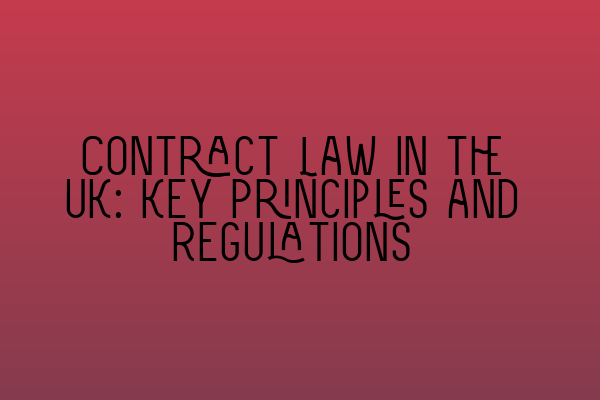Contract Law in the UK: Key Principles and Regulations
Contract law is a fundamental aspect of the legal system in the United Kingdom. It governs the rights and obligations of parties involved in a legally binding agreement. Understanding the key principles and regulations of contract law is essential for individuals and businesses alike.
In this article, we will explore some of the fundamental aspects of contract law in the UK, providing you with a comprehensive overview of its key principles and regulations. We will cover topics such as the formation of a contract, essential elements, types of contracts, breach of contract, and remedies available.
Formation of a Contract
A contract is formed when two or more parties reach an agreement that is legally binding. For a contract to be valid, it must meet certain requirements:
- Offer and acceptance: An offer is made by one party to another, and the other party accepts the offer.
- Consideration: There must be something of value exchanged between the parties, such as money, goods, or services.
- Intention to create legal relations: Both parties must intend for the agreement to be legally binding.
- Capacity: The parties must have the legal capacity to enter into a contract, meaning they must be of legal age and mentally competent.
Once these requirements are met, a contract is formed and the parties involved are legally obligated to fulfill their respective duties and obligations.
Essential Elements of a Contract
Contracts are comprised of various essential elements:
- Offer: The offer is a proposal made by one party to another. It must be clearly defined, certain, and communicated to the other party.
- Acceptance: Acceptance occurs when the party to whom the offer is made agrees to the terms and conditions presented in the offer.
- Consideration: Consideration refers to something of value exchanged between the parties. It can be money, goods, or services.
- Intention to create legal relations: Both parties must intend for the agreement to be legally binding.
- Capacity: The parties involved must have the legal capacity to enter into a contract.
- Certainty: The terms and conditions of the contract must be sufficiently clear and definite.
These essential elements collectively ensure that a contract is valid and enforceable.
Types of Contracts
Contracts can be categorized into various types:
- Written Contracts: These are contracts that are documented in writing and signed by the parties. They provide clear evidence of the terms and conditions agreed upon.
- Oral Contracts: Oral contracts are verbal agreements made between parties. They can be legally enforceable, although proving their existence may be more challenging than with written contracts.
- Implied Contracts: Implied contracts are not explicitly stated but are formed based on the conduct of the parties involved.
- Express Contracts: Express contracts are contracts in which the terms and conditions are explicitly stated, either in writing or verbally.
- Unilateral Contracts: Unilateral contracts involve one party making a promise in exchange for a specific action or performance from the other party.
- Bilateral Contracts: Bilateral contracts are agreements where both parties make promises to each other.
Each type of contract has its own set of rules and regulations, and it is crucial to understand the specific requirements for each type.
Breach of Contract
A breach of contract occurs when one party fails to fulfill their obligations as stated in the contract. This can take various forms, such as non-payment, failure to deliver goods or services, or non-performance of agreed-upon duties.
When a breach of contract occurs, the innocent party has the right to seek compensation or specific performance. Compensation may involve the payment of damages to cover any losses suffered as a result of the breach, while specific performance may require the defaulting party to fulfill their obligations as outlined in the contract.
It is important to note that not all breaches of contract automatically entitle the innocent party to compensation or specific performance. The specific terms and conditions of the contract, as well as the circumstances surrounding the breach, will determine the appropriate legal remedies.
Remedies Available
When a contract breach occurs, several remedies may be available to the innocent party:
- Damages: Damages are a common remedy for breach of contract and involve the payment of money to compensate the innocent party for any losses suffered.
- Specific Performance: Specific performance requires the defaulting party to fulfill their obligations as outlined in the contract.
- Rescission: Rescission allows the innocent party to cancel the contract and be released from any further obligations.
- Reformation: Reformation involves altering the terms of the contract to make it enforceable.
- Injunction: An injunction is a court order that prohibits one party from taking certain actions as outlined in the contract.
The appropriate remedy will depend on the specific circumstances of the breach and the preferences of the innocent party.
Contract law is a complex area, and understanding its key principles and regulations is crucial for individuals and businesses alike. If you require legal advice or guidance regarding contract law in the UK, it is advisable to seek the assistance of a qualified solicitor. Mentorship for Aspiring Solicitors: Nurturing Talent in the Legal Field
To delve deeper into related legal topics, consider reading our Legal Challenges and Pitfalls: Navigating the Complexities of the Legal System or Demystifying the Solicitors Qualifying Examination (SQE): What You Need to Know articles. Furthermore, if you’re seeking mentorship as an aspiring solicitor, read our Mentorship for Aspiring Solicitors: Finding Guidance on Your Legal Journey article. Additionally, if you want to explore an alternative approach to resolving legal conflicts, our article on Exploring Alternative Dispute Resolution: An Effective Approach to Legal Conflicts may be of interest to you.
